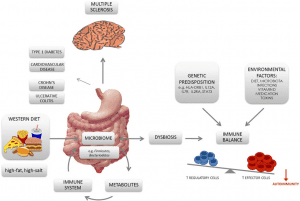If you have an unhealthy gut, there will be a bad impact on your overall health. The major consequence will be on the appearance of your skin that will cause inflammation, eczema, and rosacea. The gut microbiome is bacteria present in your intestines that affects your skin significantly along with some bad impacts on your health. Everyone has bacteria in their small intestine that play a key role in process of digestion. But if things get out of balance, real problems can happen. Let’s find out about SIBO and Gut Health Nexus.
The skin diseases related to SIBO are as follows:
Rosacea: Its triggering factors are myriad. They include dietary factors; an association of GI disorders such as IBS is very plausible. Also, studies have demonstrated that rosacea patients have higher SIBO prevalence and the proper treatment of SIBO can significantly reduce the symptoms of rosacea.
Can SIBO cause acne?
Diet, lifestyle, and SIBO may lead to a leaky gut which worsens acne. To address the root cause of your acne for good, we need to repair the gut wall to treat leaky gut and reduce whole-body inflammation. Dermatologists have hypothesized that emotional states might alter normal microbiota, enhance intestinal permeability and contribute to systemic inflammation. Moreover, the acne patients are at higher risk of GI distress. The antimicrobial SIBO treatment helps to restore normal intestinal functioning.
Association between gut disorder and skin conditions:
SIBO is a condition involving inappropriate growth of bacteria in the small intestine and is more prevalent in people with acne rosacea. Hence, treating the SIBO will lead towards the development of gut health that would eventually result in improving your skin conditions.
How altered gut function impact your skin?
Leaky gut causes local and systematic inflammation that leads to skin disorders. The main function of skin is to act as barrier against physical, chemical, and antimicrobials. Studies reveal that stress and gut inflammation despair the integrity and protective function of skin epidermis. Hence, it, in turn, increases the severity of infection along with inflammation. The gut flora influences the skin. An altered gut microbiome causes the release of substance P in both gut and skin and probiotics can attenuate this response. Along with this, the Gut microbiota influences lipid and fatty acid profile functioning that influence sebum production as well as its composition.
Role of diet:
Studies reveal that an omega-3 deficient diet has been likely to increase SIBO in animals. Recent studies have revealed that there may be a connection between the risk of acne and dietary components, most notable in low-fiber carbohydrates. It has been found that regional foods low in glycemic content containing less sugar and are less processed alleviate the risk of causing acne. There has been some positive correlation found between dairy products (fermented) and acne.
Role of probiotics in improving skin conditions:
It has been found that oral probiotics regulate the release of pro-inflammatory cytokines within the skin. These oral probiotics also reduce the systemic markers of inflammation and oxidative stress which are elevated in acne. Lactobacillus acidophilus and Bifidobacterium bifidum along with some standard care led to better clinical outcomes than standard care alone.
Check out more about Gut Health and make well-informed choices.
For more information about the GI map stool test, Click here!


